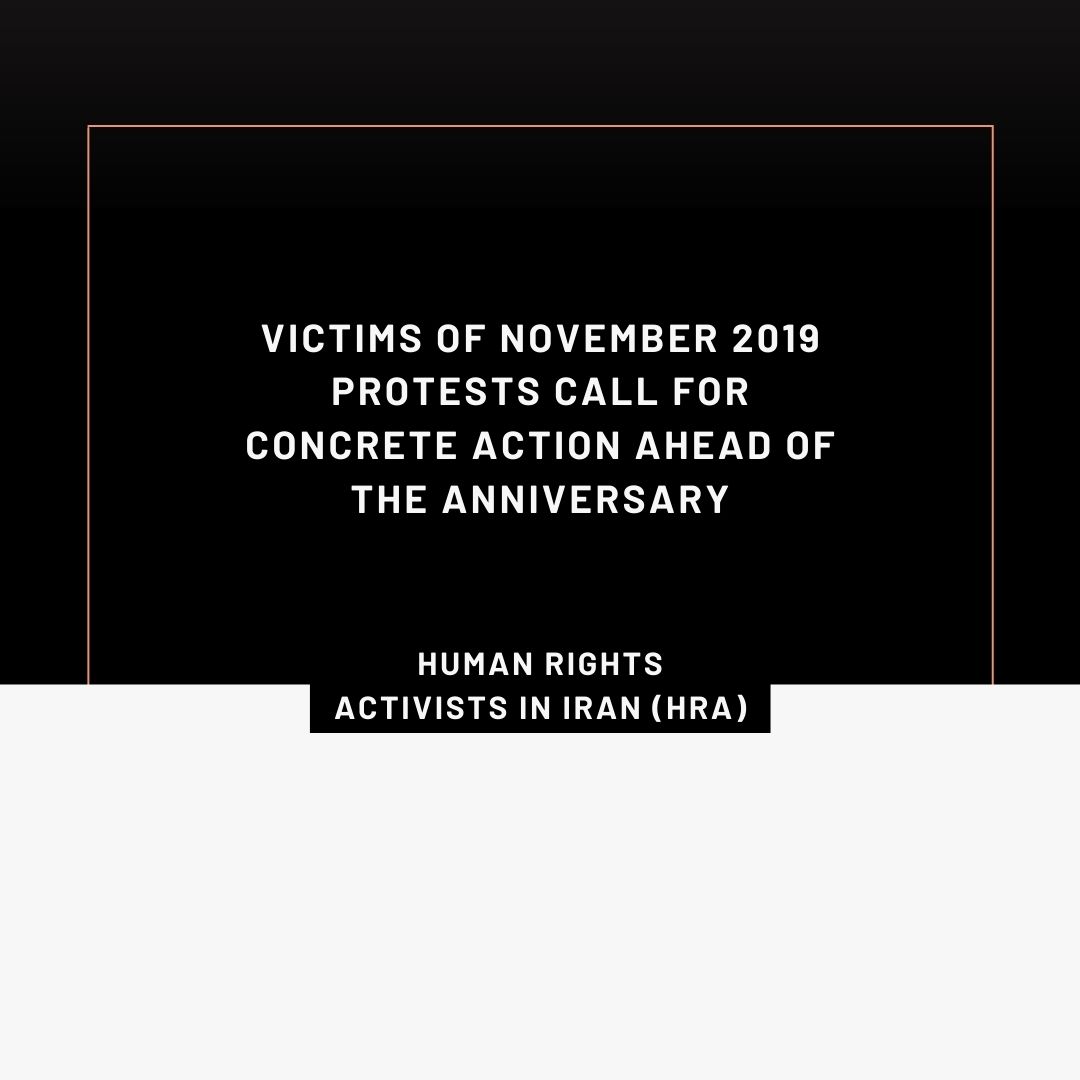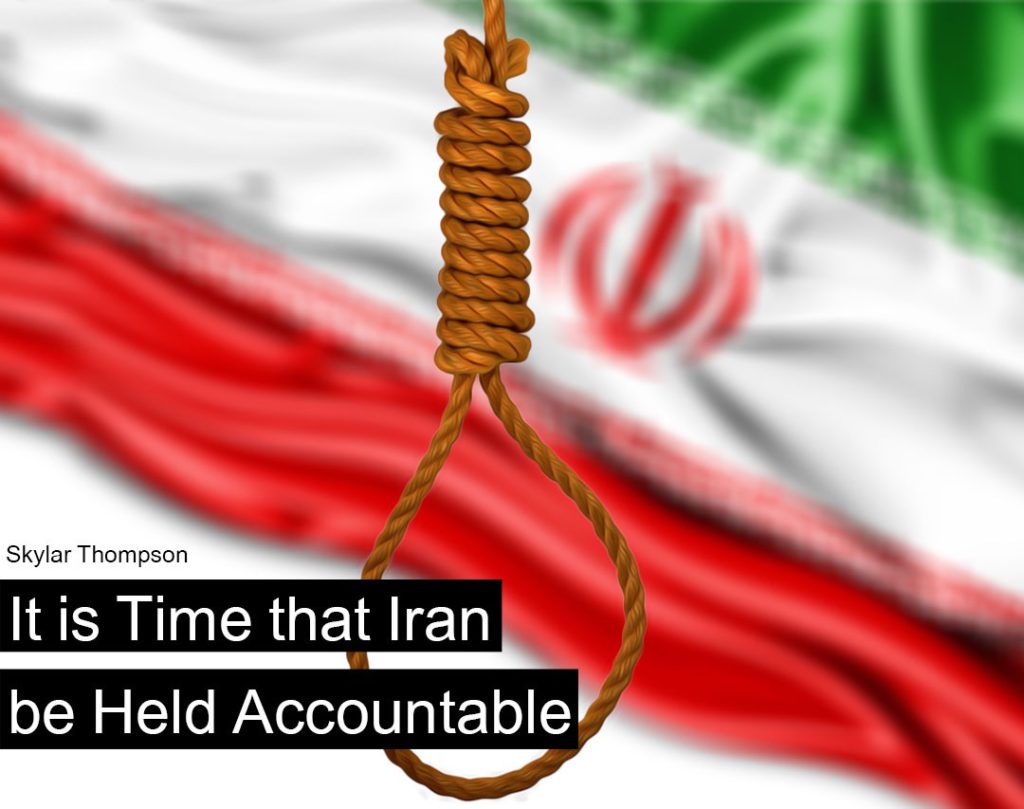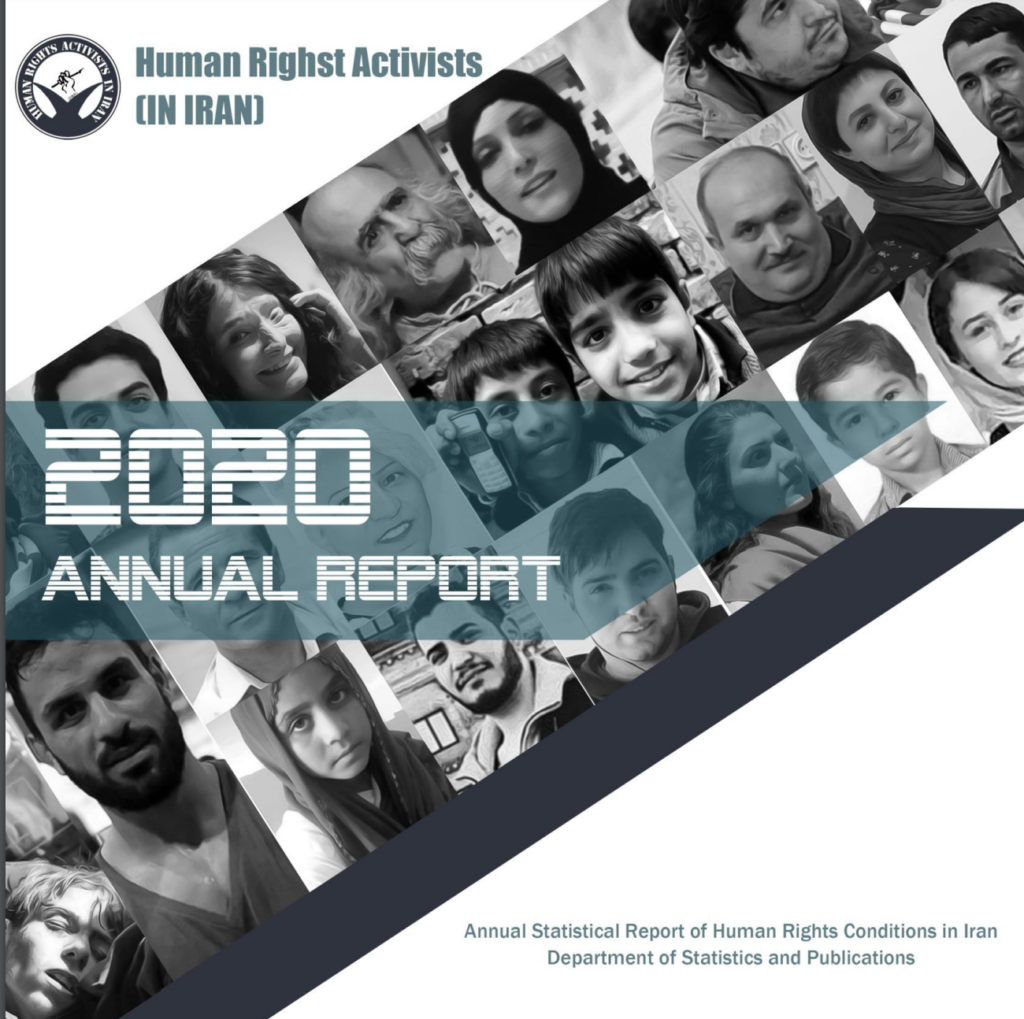
NOVEMBER 15, 2019: A sudden and substantial hike in the cost of fuel sparks unrest across Iran. Individuals across the country pour into the streets in what soon became mass protests covering a reported 104 cities across Iran.
As the anniversary of the November protests approaches, HRA has spoken with Iranians calling for concrete action against those responsible for violent crackdowns against protesters including arbitrary and incommunicado detention, illegal use of force, and torture among other serious violations. For nearly two years, perpetrators have, for the most part, enjoyed widespread impunity. Domestically, some have even seemingly been rewarded. Indeed, individuals such as now-President Ebrahim Raisi, a known and serious violator, have risen to top positions of power.
Soheila, a 45-year-old mother whose son was shot in the November 2019 protests, highlights the shortcomings of the judiciary in Iran, telling HRA, “I hope that accountability will mean that next time, my child, instead of taking to the streets, can work through established pathways to hold corrupt people accountable for their actions.”
November 2019 saw the deaths of several hundred Iranians (227 were verified by HRA) in what is arguably a state-sanctioned arbitrary deprivation of life. In addition over 7,100 were arbitrarily detained, some remain detained today. Although the violations noted above have been extensively documented, little has been done to hold perpetrators accountable.
Figure 1: reported November 2019 protest points -black denotes locations where the killing of protester(s) was reported (Human Rights Activists in Iran)
Elika, 25, told HRA, “Without accountability for violations that occurred in November 2019, the cycle of repression and violence will not end. Those that intend to perpetrate future abuse [on us] need to see accountability. Maybe then they will take a moment to think before pulling the trigger.” In a recent post in the Atlantic Council IranSource blog, Skylar Thompson, HRA Senior Advocacy Coordinator, stated similarly, “Without concrete action to fight the plague of impunity that covers Iran, these violent events will only continue to occur and the Iranian people will continue to suffer.”
Iran has proven unwilling to investigate and prosecute those responsible through domestic judicial frameworks. The unwillingness is paired with the fact that Iran’s judiciary is in no way impartial and is in fact led by the very perpetrators responsible for the noted violations. Unfortunately, violations of fair trial standards have become the status quo.
When asked what accountability looks like to him, Hafez, 22, told HRA, “They should handcuff the perpetrators. […]. They should be prosecuted in a public court and imprisoned.” He continued, “Once handcuffed, perpetrators should have to look the victim’s mother in the face to calm her heart.” Nazanin, 32, told HRA that accountability, in her view “is [the Islamic Republic] honestly and openly admitting wrongdoing.”
HRA has identified 54 individual and seven institutional violators connected to the November 2019 protests. It Is noteworthy that a number of those violators have also been complicit in numerous additional acts of repression against protesters including in 1988, 2020 (protests over the shooting down of Ukrainian airliner), 2021 (protests over resource mismanagement in Khuzestan), and many instances in between. This repeated action is a direct consequence of the lack of accountability.
The following section lists notable individuals documented by HRA as responsible for repeated serious and widespread rights violations. Extensive and credible documentation is readily available. HRA calls on the international community to hear the pleas of Iranians like Hafez, Nazanin, and Elika and utilize available documentation to take concrete action against those responsible.
*For a more in-depth look at the listed violators select a name and be directed to a violator profile that includes several data points including an overview of violations, employment history, as well as additional evidentiary documentation.
Government
Special Governor, Najafabad City of Isfahan Province
Deputy Governor of Isfahan
The police commander of Fars Province
Representative of the Supreme Leader, Fars Province
Friday Imam of Shiraz
Leila Vaseghi
Governor of Quds City
Jamal Alami Nisi
Governor of Ahvaz
Chairman of the Ahvaz City Security Council
Masoumeh Khanfari
Governor of Karoun City
Nik-Mohammad Balouch-Zehi
Director-General, Information and Communications Technology Department of Sistan and Baluchestan Province
Seyed-Vahid Haghanian aka “Vahid” or “Sardar (General) Vahid”
Executive and Special Affairs Deputy of the Islamic Republic Supreme Leader’s office
Saeed Jalili
Secretary of the Supreme National Security Council
Police
Kermanshah Police Chief
Hossein Rahimi
Head of Tehran Police Forces
Commander of the police force of the Islamic Republic
From November 12, 2019, to now: Commander of the Hormozgan Police Force
Hassan Karami
Command of the Special Unit of the Police Force
Mohammad-Hossein Babakalani
Retired Police Force
North Khorasan Police Chief
Reza Papey
The police commander of Mahshahr City
Abdolreza Nazeri
Commander of the Kerman Police Force
Ruhollah Geravandi
Dezful Police Commander
Chaharmahal and Bakhtiari Police Commander
IRGC
Brigadier General IRGC
Former Head of the IRGC Intelligence Organization
Hassan Shahvarpour
Commander of the Khuzestan Provincial IRGC force (Valiasr IRGC base)
Masoud Khorramnia
Second Brigadier General (IRGC)
Commander-in-chief of West Azerbaijan province
Mohammad-Esmaeil Kowsari
Senior Commander, IRGC
Commander-in-Chief of the IRGC
Senior Commander of IRGC
Gholamreza Soleimani Farsani
Commander of Sahib al-Zaman IRGC in Isfahan province
Gholam-hossein Gheibparvar
Commander of the Basij
Deputy Commander of the IRGC, Imam Ali’s HQ
Mousa Ghazanfar-Abadi
The former head of the Islamic Revolutionary Tribunals of Tehran
Judiciary
Senior Judicial Official, Judiciary of the Islamic Republic
Alireza Aghajari
Public and Revolutionary Prosecutor of Pardis city, the former prosecutor of Mahshahr city
Prisoner Supervisor in Ward 9, Evin Prison
Deputy Director of the 2nd Brigade in Fashafoyeh Prison
Deputy Prosecutor of Boroujerd
Hamid Golinejad
Head of Branch 101 of the 2nd Criminal Court of Urmia
Ali Esfahani
Public and Revolutionary Prosecutor of Isfahan Province
Ali Zare
General and Revolutionary Prosecutor of Najafabad city in Isfahan province
Judicial Official, Judiciary of the Islamic Republic
Mohammad-javad Heshmati Mohazzab
Senior Judicial Official, Judiciary of the Islamic Republic
Public and Revolutionary Prosecutor of Kermanshah Province
Hamid Mohammadi
Head of Evin Prison
Mansour Mohammadi Khabbaz
The public and revolutionary prosecutor of Dezful
Public and Revolutionary Prosecutor of Khuzestan Province
Hamid Asgaripour
Shahriar County Public Prosecutor and Revolution
Mahamad-Reza Amouzad Khalili
Judge
Head of Branch 24 of the Revolutionary Court of Tehran
Seyed-Ahmad Zargar
Judge of the Islamic Revolutionary Tribunal of Tehran
Iman Afshari
Judge
Head of Branch 26 of the Revolutionary Court of Tehran
Mohammad Mahdi Mahmoodi
Deputy Chief Justice of the General and Revolutionary Courts of Shiraz
Head of the 2nd Criminal Court
Judge of Branch 101 of the 2nd Criminal Court of Shiraz
Ali Alghasi-Mehr
The general prosecutor of Tehran
Media
Hossein Shariatmadari
Kayhan Institute
Abdolali Ali-Asgari
Head of the Islamic Republic Broadcasting Organization (IRIB)
Ameneh-Sadat Zabihpour
Interrogator-Reporter
For media inquiries contact HRA Senior Advocacy Coordinator, Skylar Thompson [email protected]



